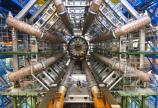UVic’s Higgs detectives
- Tara Sharpe

On July 4, the triumphant cheering from scientists and armchair cosmologists was thunderous in response to the announcement of the latest results in physicists' search for the elusive Higgs boson. And a large group of UVic researchers who have had significant involvement in the experiments had good reason to join in the celebrations.
The Higgs boson only lives for a fraction of a second. Particle physicists have tracked traces of the decay of a new particle, and now data have shown a statistically significant “blip”: a mass of around 126 GeV with a 99.99994 per cent certainty. In lay terms, this means only one experiment in two million would see a signal this strong in a universe without this new particle, which is likely to be a Higgs—the particle responsible for the mass of all things.
UVic has been in the loop since the very beginning. The Large Hadron Collider, buried deep underground, is a giant ring built by the European Laboratory for Particle Physics (CERN) to accelerate protons into head-on collisions. ATLAS is one of two large detectors recording the subatomic debris, and in 1992, the UVic group brought Canadians into it.
“Now we have a new piece of information about the fabric of the universe,” says UVic physicist Michel Lefebvre, founding spokesperson of ATLAS-Canada. “This is not the end of the story. It’s only the beginning.”
The current results, unveiled July 4 at a seminar held at CERN, were webcast live to institutions around the world, confirming telltale signs first seen in December 2011.
“It has been described as reaching land at the end of a long voyage of discovery,” says Rob McPherson, ATLAS-Canada spokesperson and UVic adjunct professor. “Last winter, there was a smudge on the horizon and now, land is sighted, all paddles are in the water and the wind is blowing in the right direction to reach shore.”
The UVic team—now numbering more than 25 people—is responsible for maintaining its detector components (including calorimeters, which measure energy), poring over thousands of gigabytes of data, and developing strategies and software to be ready for such new discoveries as the Higgs.
The ATLAS data centre is housed at TRIUMF, the national laboratory founded by UVic, UBC and SFU in the 1960s.

